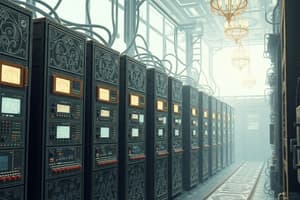Podcast
Questions and Answers
¿Qué aplicación médica utiliza sistemas PLC para mejorar la seguridad y los resultados del paciente?
¿Qué aplicación médica utiliza sistemas PLC para mejorar la seguridad y los resultados del paciente?
- Sistemas de monitorización ambiental
- Control de acceso
- Sistemas de riego
- Robots quirúrgicos (correct)
¿Cuál es una desventaja de los PLC mencionada en el texto?
¿Cuál es una desventaja de los PLC mencionada en el texto?
- Alto costo
- Vulnerabilidad a ciberataques (correct)
- Gran capacidad de procesamiento
- Flexibilidad limitada
¿En qué aplicaciones se utilizan los PLC para automatizar la distribución de agua y controlar sistemas de riego?
¿En qué aplicaciones se utilizan los PLC para automatizar la distribución de agua y controlar sistemas de riego?
- Aplicaciones médicas
- Agricultura y ganadería (correct)
- Monitoreo ambiental
- Seguridad y vigilancia
¿Qué función de seguridad pueden tener los PLC para prevenir accidentes e lesiones?
¿Qué función de seguridad pueden tener los PLC para prevenir accidentes e lesiones?
¿Qué limitación de los PLC se menciona en el texto en comparación con las computadoras modernas?
¿Qué limitación de los PLC se menciona en el texto en comparación con las computadoras modernas?
¿Cuál es una ventaja clave de los PLC mencionada en el texto?
¿Cuál es una ventaja clave de los PLC mencionada en el texto?
¿Qué función cumplen los PLC en el ámbito de la fabricación?
¿Qué función cumplen los PLC en el ámbito de la fabricación?
¿Cuál es una aplicación común de los PLC en el sector de la construcción?
¿Cuál es una aplicación común de los PLC en el sector de la construcción?
¿En qué área desempeñan los PLC un papel esencial relacionado con la seguridad pública?
¿En qué área desempeñan los PLC un papel esencial relacionado con la seguridad pública?
¿Cuál es el rol clave que desempeñan los PLC en el ámbito de la energía y los servicios públicos?
¿Cuál es el rol clave que desempeñan los PLC en el ámbito de la energía y los servicios públicos?
Flashcards are hidden until you start studying
Study Notes
Programmable Logic Controllers (PLCs): A Comprehensive Exploration of Applications
Programmable Logic Controllers, or PLCs, are electronic devices that have revolutionized industrial automation, paving the way for efficient manufacturing processes and streamlined operations. PLCs combine the functionalities of digital and analog electronics, enabling them to process and control complex systems based on logic programming and real-time data.
Applications of PLCs
-
Manufacturing: PLCs can be found in nearly all manufacturing environments, controlling and monitoring production lines, robotic systems, and assembly lines. They improve production efficiency, reduce defects, and minimize waste.
-
Building Automation: PLCs are widely employed in building automation systems, managing heating, ventilation, and air conditioning (HVAC), lighting control, and access control. They enhance comfort, safety, and energy efficiency.
-
Transportation: PLCs are essential in transportation systems, such as traffic control systems, railway controls, and traffic signals. They ensure smooth operations and contribute to public safety.
-
Energy and Utilities: PLCs play a vital role in power distribution, monitoring renewable energy sources, and managing smart grids. They improve energy efficiency and grid reliability.
-
Agriculture: PLCs are used in agriculture and farming to automate water distribution systems, control irrigation systems, and implement livestock monitoring systems.
-
Environmental Monitoring: PLCs are employed in environmental monitoring systems to detect pollution, manage wastewater treatment plants, and monitor air quality.
-
Medical Applications: PLCs are used in medical equipment, such as surgical robots, medical imaging systems, and patient monitoring systems, to improve patient safety and outcomes.
-
Security and Surveillance: PLCs are used in security and surveillance systems, such as access control, intrusion detection, and video surveillance.
Advantages of PLCs
- Flexibility: PLCs are highly versatile and can be adapted to various applications.
- Programmability: PLCs can be programmed using Ladder Logic, Function Block Diagrams, Structured Text, and Sequential Function Charts.
- Durability: PLCs are built to withstand harsh environments, including dust, humidity, and extreme temperatures.
- Safety: PLCs can be programmed with safety functions, such as emergency stops and interlocks, to prevent accidents and injuries.
- Cost: PLCs are comparatively affordable, making them accessible to a broad range of industries.
Drawbacks of PLCs
- Programming Skills: PLCs require specialized programming skills, which can be challenging to acquire.
- Security: PLCs can be vulnerable to cyberattacks, which may lead to system failures and security breaches.
- Limited Processing Power: PLCs have limited processing power compared to modern computers, which can limit their capabilities in complex applications.
In summary, PLCs are an indispensable component of modern industries, offering unparalleled flexibility and versatility in controlling and monitoring complex systems. Their widespread applications span across various industries, illustrating the significance of PLCs in the digital age. As technology advances, PLCs will continue to evolve and improve, providing innovative solutions to the challenges of tomorrow.
Studying That Suits You
Use AI to generate personalized quizzes and flashcards to suit your learning preferences.




